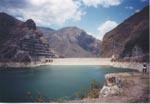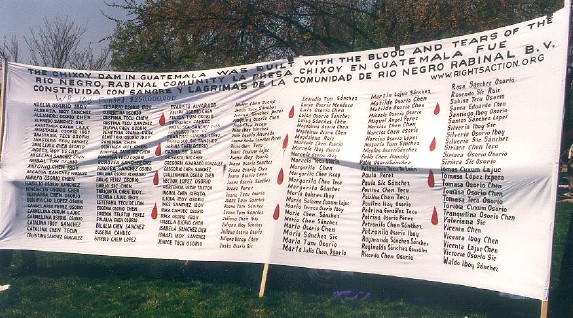- appoint an independent commission (with civilian participation from Guatemala and the US) to investigate and publicly report on their role and responsibility in the Chixoy Dam Project experience.
- fully compensate and provide reparations to the communities affected by the construction of the Chixoy Dam, based on close consultation with the affected populations.
- cancel all debt related to the Chixoy Dam project in which the economic, environmental and social costs outweigh the benefits realized.
- establish policies that ensure that they refrain from providing funds to governments currently implicated in systematic human rights violations or involved in armed conflicts.
- stop funding large dams and all projects involving involuntary resettlement.
- 30 -
For interviews with Carlos Chen, please contact Rights Action.
For comment on the World Bank, Dams and Reparations, please contact Aviva Imhof, IRN.
- A briefing paper on the Chixoy Dam project is available from Rights Action.
- A briefing paper on the World Bank, Dams and the Quest for Reparations is available from IRN.
- International Rivers Network Rights Action
- www.irn.org
- www.rightsaction.org
Rights Action raises funds for community development & human rights projects in Southern Mexico, Guatemala & Honduras, and educates in the US & Canada about international development and human rights issues.
International Rivers Network supports local communities working to protect their rivers and watersheds. IRN works to halt destructive river development projects, and to encourage equitable and sustainable methods of meeting needs for water, energy and flood management.
*=*=*=*=*=*=*=*=*=*=*=*=*=*=*=*=*=*=*=*=*=*=*=*=*=*=*=*=*=*
Aviva Imhof
South-East Asia Campaigner
International Rivers Network
http://www.irn.org
*=*=*=*=*=*=*=*=*=*=*=*=*=*=*=*=*=*=*=*=*=*=*=*=*=*=*=*=*=*
"States of Unrest" | IMF/ WB Struggles | Dam Protests | PGA
Chixoy Dam Reparations Campaign, #11
January 29, 2001 www.rightsaction.org
"Chixoy Dam / Rio Negro Massacres Reparations Campaign"
-- Communique #11
Announcing a new website: www.advocacynet.org
*******
Dear friends,
Thanks to you who, last fall, sent letters [emails, fax, mail] to the World Bank and the Inter-American Development Bank, asking that they seriously address the demands of the survivors of the Chixoy Dam/Rio Negro Massacres in Guatemala, for compensation and reparation.
Your letters are having an impact.
We will soon send a campaign update, asking you to again contact the WB and the IDB.
Meanwhile, we draw your attention to the new website of the Advocacy Project where you will find, amongst other information, their series on the efforts of the Rio Negro survivors to claim compensation and reparations for massacres that destroyed the community in 1982.
[Amongst the fine and important work of the Advocacy Project, you will also find a series they did, in conjunction with Rights Action, on the aftermath of Hurricane Mitch.]
Also, for previous information concerning this "Chixoy Dam / Rio Negro Massacres Reparations Campaign," visit our website www.rightsaction.org, or contact us info@rightsaction.org)
- Please copy and re-distribute or publish this information
- Tell us if you do not want to receive these emailings
- If you would like to financially or otherwise support the Chixoy Dam/Rio Negro Massacres Reparations Campaign, contact us [Information below]
*******
Advocacy Project Announcements
www.advocacynet.org
Washington DC (USA) and Geneva (Switzerland)
January 11, 2001
*****
ADVOCACY PROJECT WEBSITE IS ON-LINE
The Advocacy Project works to support advocates across the globe working on the frontlines for peace and human rights. Our new site can be visited at: www.advocacynet.org. The site has been designed by AeroNet Communications (www.aeronet.net), under the supervision of Teresa Crawford, technical director of the Advocacy Project.
The Advocacy Project is a virtual organization created in June 1998 to provide e-coverage of the Rome conference on the creation of the International Criminal Court. Since then it has evolved into a more general effort to help advocates get their message out, and to lobby on their behalf. As the website notes: "advocates are an excellent investment - they make a huge impact on tiny budgets."
The Advocacy Project has worked with eleven major grassroots campaigns since 1998. Three are profiled on the new web site:
- The campaign by the Guatemalan Indigenous community of Rio Negro to claim compensation for massacres that destroyed the community in 1982;
- The coalition of activists who have come together in Nigeria to stop the trafficking of Nigerian women to Europe;
- The struggle by civil society in Kosovo to make its voice heard during Serbian repression, war, and the 1999 invasion by humanitarian aid agencies.
Among its features, the website carries back issues of the Project's e-newsletter 'On the Record', which is distributed free of charge to thousands of subscribers. Thirteen volumes have been produced since 1998. Visitors will also find a photo archive and background material linked to the individual campaigns.
The Advocacy Project also provides technical assistance and other forms of support to advocates across the globe. Last year, the Project put together an 'advocacy package' for the Women's Consortium of Nigeria (WOCON). The AP technical director has also worked with the US Institute of Peace to link community leaders in Kosovo up to the internet. More details about the services on offer are available on the new site.
The Advocacy Project only works at the express invitation of advocates, and in partnership with nongovernmental organizations. It has received funding from a variety of foundations, NGOs and governments.
The Project is currently reviewing over twenty projects for 2001, which have been suggested by partners. These include invitations: to cover the proceedings of the special session of the UN General Assembly on children; to profile the work of Palestinian groups responding to the current violence; and, to support indigenous communities in Ecuador that have been affected by oil exploration.
For more information, visit the website at: www.advocacynet.org
*******
Rights Action [formerly Guatemala Partners] www.rightsaction.org
"States of Unrest" | IMF/ WB Struggles | Dam Protests | www.agp.org (archives) | www.all4all.org
argentina | bolivia | brasil | chile | colombia | costa rica | ecuador | honduras | mexico | panama | paraguay | peru | uruguay | venezuela
 Guatemala [Chixoy Dam] Reports
Guatemala [Chixoy Dam] Reports
